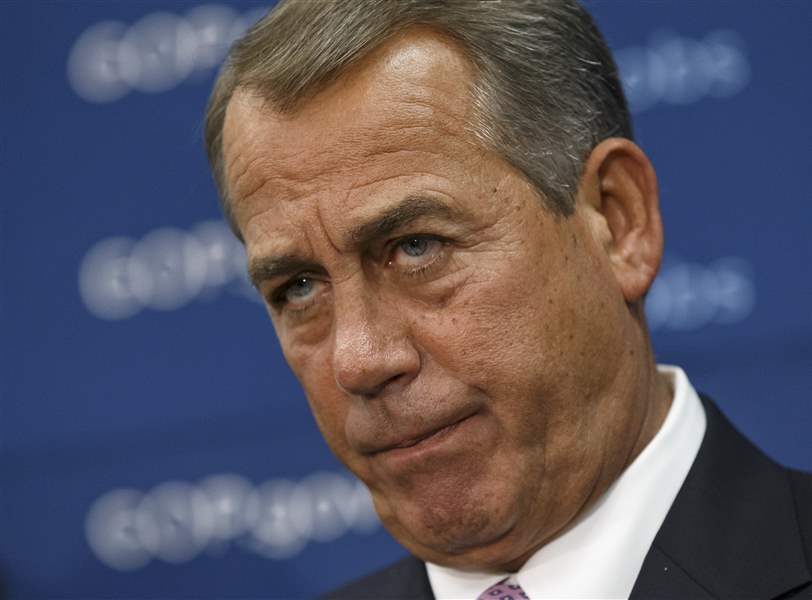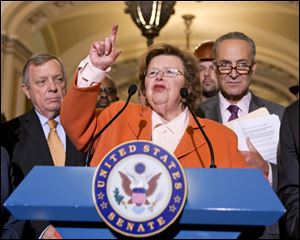
With little drama, House approves government-wide $1.1T budget as Senate waits its turn
1/15/2014
House Speaker John Boehner, of Ohio, and GOP leaders face reporters on Capitol Hill in Washington, Tuesday, Jan. 14, 2014, after a weekly House Republican Conference meeting. The Republicans tied the recent stagnant employment reports to the policies of President Barack Obama and Democratic lawmakers. (AP Photo/J. Scott Applewhite)
ASSOCIATED PRESS

Senate Appropriations Committee Chair Sen. Barbara Mikulski, D-Md., flanked by Senate Majority Whip Richard Durbin of Ill., left, and Sen. Charles Schumer, D-N.Y., speaking on Capitol Hill in Washington.
WASHINGTON — Party leaders pushed a massive $1.1 trillion spending bill for this year through the House on today, shunning the turmoil of recent budget clashes with a compromise financing everything from airports to war costs and brimming with victories and concessions for both parties.
The huge bill furnishes the fine print — 1,582 pages of it — for the bipartisan pact approved in December that set overall spending levels for the next couple of years. With that decision behind them, the measure sailed through the House with no suspense and little dissent — fueled additionally by lawmakers’ desire to avoid an election-year replay of last fall’s widely unpopular 16-day federal shutdown.
Approving the legislation “is showing the American people we actually are capable of working in a bipartisan manner,” said Rep. Tom Cole, R-Okla. He praised the bill for holding down spending and said passage would be “the responsible thing to do. It’s the thoughtful thing to do.”
The measure was approved by a one-sided XXX-XXX roll call, with virtually all opposition coming from Republicans.
By its sheer size and detail, the measure had plenty for liberals and conservatives to dislike. Some Democrats said they would support it but only reluctantly, complaining that despite some increases, spending for education, health and other programs would still be too low.
“With this bill, we are waste deep in manure instead of neck deep in manure. Hooray, I guess,” said Rep. Jim McGovern, D-Mass.
Reflecting those mixed emotions, Rep. Barbara Lee, D-Calif., praised the measure because she said it would “get us out of this cycle of governing by crisis.” But she added that its spending for social programs was “far too low for too many people to really achieve the American dream.”
The Democratic-run Senate planned to bestow final congressional approval of the legislation by the end of the week.
To keep agencies functioning while Congress votes on the legislation, the Senate by a 86-14 vote gave final congressional approval to a measure financing the government through Saturday. An earlier short-term spending measure expires after midnight today evening.
The giant bill debated today heads off an additional $20 billion in automatic cuts to the Pentagon’s budget — on top of $34 billion imposed last year — and cuts to many domestic programs as well. The reductions were being triggered by a 2011 law that forced the cuts after President Barack Obama and Congress failed to negotiate budget savings.
Conservative groups like Club for Growth and Heritage Action were urging lawmakers to oppose it, but the White House urged its passage.
“We met compelling human needs. We certainly preserved national security,” said Senate Appropriations Committee Chairwoman Barbara Mikulski, D-Md., chief author of the spending bill with her House counterpart, Rep. Hal Rogers, R-Ky.
The measure provided money for Obama’s 2010 health care overhaul and his revamping of federal oversight of the nation’s financial markets — though not as much as he requested. It continued age-old restrictions on federal financing of most abortions, but lacked new ones. Democrats also blocked GOP-sought curbs on the Environmental Protection Agency’s power to regulate utilities’ greenhouse gas emissions.
“It’s funding Obamacare, and I pledged a long time ago I absolutely wouldn’t vote for anything that has financing for Obamacare,” said Rep. Phil Gingrey, R-Ga., who said he’d vote “no.”
Overall, the measure provides about $20 billion more for defense and domestic programs this year than was spent in 2013, excluding the costs of war and natural disasters. Even so, it still leaves defense and domestic spending on a downward trend since 2010, a number that troubles many Democrats.
“For several years we’ve been cheating Americans of a number of things we should be doing for infrastructure, science research, education, to make our country stronger,” said Rep. Rush Holt, D-N.J., who said he hadn’t decided how he would vote.
The bill would provide nearly $92 billion for U.S. military operations abroad, mostly in Afghanistan, plus about $7 billion for disasters and other emergencies. That was just slightly less than last year’s war spending but about $44 billion less than was provided in 2013 for disasters, after Hurricane Sandy ravaged the Northeast in October 2012.
One widely supported provision would roll back a reduction in annual cost-of-living increases for wounded military personnel who retire early or for their surviving spouses. That language was part of the savings included in the budget compromise by Ryan and Murray enacted last month, money that was used to help soften cuts in other programs.
Some Western lawmakers were angry that the bill would block federal payments to communities near government lands to compensate for the taxes the government is exempt from paying them. Top lawmakers promised the payment would be restored in a separate measure.
The Internal Revenue Service, a pariah agency for Republicans after revelations that it targeted tea party groups for tough examinations, would get $500 million less than last year. It also was receiving none of the $440 million extra Obama wanted so the agency could help enforce Obama’s health care law, another favorite GOP target.
Democrats won extra money for Head Start’s preschool programs, enough to serve another 90,000 young children. The Federal Aviation Administration would get less than Congress enacted last year, but enough money was included to avoid 2013’s furloughs and hiring freezes for air traffic controllers.
The FBI won extra money, including almost twice as much to help it conduct background checks on firearms purchasers. The National Institutes of Health would get $29.9 billion, about $1 billion above last year’s budget.